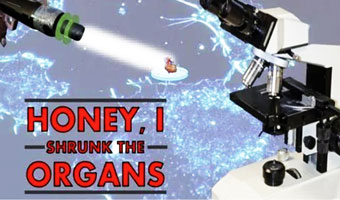
It took a daring team of Hadassah Medical Center experts to save the life of Vassilios Taufenos, a newborn from Cyprus, who was born with a serious heart defect. Hadassah was called in to help when no one else believed the infant had a chance to live.
Cypriot physicians, who had looked at Gabriella Taufenos’s ultrasound and identified the heart defect, had planned for a Caesarian section to deliver the baby, but two days before her scheduled date, Gabriella went into labor and baby Vassilios (Greek for basil) was delivered naturally.
The doctors tried to insert a shunt, but they were unsuccessful. The baby’s blood oxygen-level dropped to dangerous levels. To his parents’ despair, the end looked near. The hospital in Cyprus sought help from centers in Cyprus and abroad, but no one was willing to take a baby with such a low chance of survival.
A month earlier, Hadassah’s Dr. Ira Erlichman, a pediatric intensive care physician, had traveled to Cyprus to pick up another child with a less serious heart problem to take him to Hadassah. The coordinator phoned Dr. Erlichman to see if Hadassah would agree to take one-day-old Vassilios.
Dr. Erlichman was on military reserve duty, serving as an infantry unit’s physician. He can’t always answer his phone when on duty, but the call came on a rare day off.
“I called Prof. Eldad Erez, the pediatric cardiac surgeon,” said Dr. Erlichman. “He said the chances of success were very low, but our Prof. Erez is daring and brilliant, and he agreed to take baby Vassilios.”
Dr. Erlichman and Dr. Yulius Golander, a senior pediatric cardiologist, flew to Cyprus. “Had this child been born at Hadassah,” relates Dr. Erlichman, we would have operated immediately after birth. Even then, it would have been a tough surgery. Now we had to prepare him for a journey: to travel 40 minutes in a small ambulance, take a 50-minute flight to Israel, and then travel another 50 minutes in a second ambulance to Hadassah. We were anxious the whole time.”
Prof. Erez texted Dr. Erlichman to tell him he hadn’t found any cases in the literature where such a child could survive, but Hadassah’s specialists were determined to try to save him. “When we got to Hadassah Hospital-Ein Kerem,” Dr. Erlichman says, “the baby was rushed to the operating room. Prof. Erez was waiting.”
The condition the baby had is called transposition of the great arteries with intact ventricular septum, which means that the two main arteries leaving the heart are reversed and, therefore, the way blood usually circulates through the body is changed. The result is a shortage of oxygen in the blood that flows from the heart to the rest of the body. Sometimes a hole between the ventricles gives some relief, but Vassliios was born with the space between the ventricles intact, which worsened his chances of survival.
Despite the odds, the surgery was such a success that when rosy-cheeked Vassilios was 10 days old, he and his parents flew back to Cyprus “Thank you very much Israel,” said the happy Dad. “Thank you, Hadassah.”









